“Art, real art, is a denial of the status quo. A tradition that values the role of the individual.” Speaking in Estonia’s capital for the opening of Tallinn Music Week, the Baltic country’s President Toomas Hendrik Ilves is referring to what’s just over his shoulder. Freedom is on his mind.
Estonia shares a border with Russia, and Tallinn is just 1000km from Ukraine’s capital Kiev. Taken together, Estonia, Latvia and Belarus share an unbroken border with their former Soviet master. On the Black Sea, Ukraine is on the southern seaboard of that border, and on the Baltic, Estonia is on the northern seaboard of that border. The Russian Baltic fleet are on the move off Estonia’s shores. Russia’s land-based military are currently holding exercises over the border. Putin and his inclinations are close.
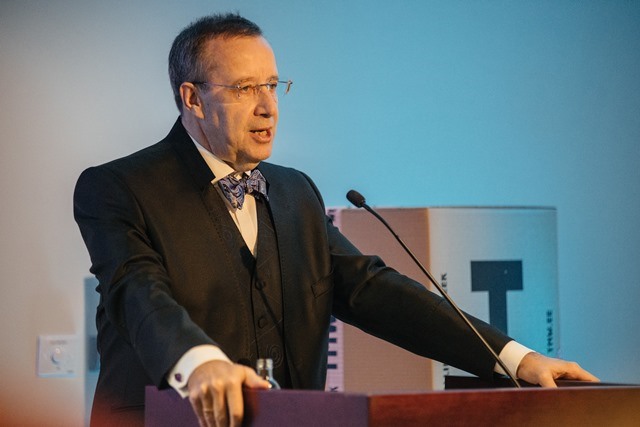 Tallinn Music Week is Estonia’s annual celebration of its music. This year though, Russia’s continued presence in Ukraine ensures the event has taken on a significance no one would have wished for. The uneasiness is compounded by the presence of Pussy Riot. Russia’s agit-art-music collective are giving an on-stage interview, arranged before Russia entered Ukraine. At Tallinn’s Ukrainian Cultural Centre, their ambassador makes his feelings about the annexation of part of his country clear. Nonetheless, the music continues. The voices of individuals are loud and clear. (Pictured right: President Toomas Hendrik Ilves opens Tallinn Music Week. Photo: Tõnu Tunnel)
Tallinn Music Week is Estonia’s annual celebration of its music. This year though, Russia’s continued presence in Ukraine ensures the event has taken on a significance no one would have wished for. The uneasiness is compounded by the presence of Pussy Riot. Russia’s agit-art-music collective are giving an on-stage interview, arranged before Russia entered Ukraine. At Tallinn’s Ukrainian Cultural Centre, their ambassador makes his feelings about the annexation of part of his country clear. Nonetheless, the music continues. The voices of individuals are loud and clear. (Pictured right: President Toomas Hendrik Ilves opens Tallinn Music Week. Photo: Tõnu Tunnel)
Most of the music is Estonian. There is also a strong Latvian and Lithuanian contingent. With Helsinki a short ferry ride away, there are also a lot of Finns. Events unfolding on Estonia’s doorstep draw attention to the local music from the country’s Baltic neighbours. Tallinn Music Week encompasses all flavours of rock and pop, and also classical music, folk and jazz. There actually is something for everyone and choices have to be made. It is entirely in the visitor’s hands.
“Freedom is not an abstraction,” continues President Ilves (watch President Ilves’s speech introducing to Tallinn Music Week overleaf). “It is the basis of our lives. When people wanted to be free, they came together and sang.” The movement leading to Estonia’s independence from Russia in August 1991 was dubbed the singing revolution. It was bloodless. People came together to sing. The message that music expresses freedom and draws people together defines this year’s Tallinn Music Week.
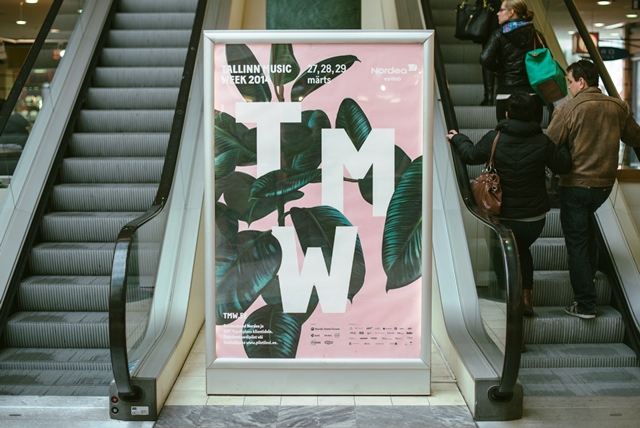 As a showcase festival, Tallinn Music Week is designed to bring both Estonia’s and the region’s music before a local and international audience. The City Stage programme takes the music into the streets, shops, galleries, museums and restaurants. This a friendly annexation. Booking agents, representatives from labels and writers are here looking for the next – not necessarily big – thing. A question is constantly heard: “How do we break out of Estonia?” Russia’s march into Ukraine has not dimmed ambitions. Business is – as it ought to be – going on as usual. (Pictured left: Tallinn Music Week takes over the city's shopping centres. Photo: Tõnu Tunnel)
As a showcase festival, Tallinn Music Week is designed to bring both Estonia’s and the region’s music before a local and international audience. The City Stage programme takes the music into the streets, shops, galleries, museums and restaurants. This a friendly annexation. Booking agents, representatives from labels and writers are here looking for the next – not necessarily big – thing. A question is constantly heard: “How do we break out of Estonia?” Russia’s march into Ukraine has not dimmed ambitions. Business is – as it ought to be – going on as usual. (Pictured left: Tallinn Music Week takes over the city's shopping centres. Photo: Tõnu Tunnel)
Thankfully, business can. Estonia is in the European Union. Its currency is the Euro. Each brings opportunities that work beyond borders. Tallinn has branches of H&M and Mango. Being outside Europe would reduce opportunities for any of Tallinn Music Week’s hopefuls to such a degree that attending would be close to pointless. More shocking, if it were to happen, reoccupation – as Estonia was, under the Soviets and and under Nazi Germany – would effectively shut Estonia down.
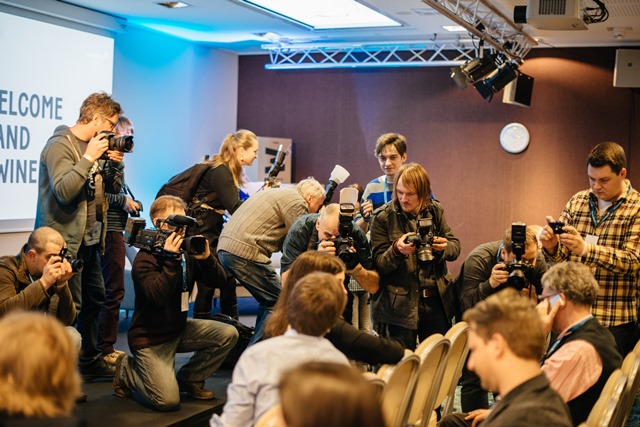 Maria Alyokhina and Nadezhda Tolokonnikova know all about being shut down. And not just, as members of Pussy Riot, by the Russian authorities. After being released from jail in December last year, they shed the anonymity which their trademark outfits gave them. Other members, ones who weren’t imprisoned, have publicly proclaimed the pair do not represent Pussy Riot. The pair have, albeit as a by-product of their inevitable passage through the Russian legal system, become public figures with recognisable faces, compromising their safety. Last month, they were assaulted in Nizhny Novgorod. In Tallinn, on stage in a conference room, they are introduced by the foremost Russian music journalist and cultural commentator Artemyi Troitsky as “the girls formerly known as Pussy Riot.” (Pictured right: the scrum greeting Pussy Riot. Photo: Tõnu Tunnel)
Maria Alyokhina and Nadezhda Tolokonnikova know all about being shut down. And not just, as members of Pussy Riot, by the Russian authorities. After being released from jail in December last year, they shed the anonymity which their trademark outfits gave them. Other members, ones who weren’t imprisoned, have publicly proclaimed the pair do not represent Pussy Riot. The pair have, albeit as a by-product of their inevitable passage through the Russian legal system, become public figures with recognisable faces, compromising their safety. Last month, they were assaulted in Nizhny Novgorod. In Tallinn, on stage in a conference room, they are introduced by the foremost Russian music journalist and cultural commentator Artemyi Troitsky as “the girls formerly known as Pussy Riot.” (Pictured right: the scrum greeting Pussy Riot. Photo: Tõnu Tunnel)
The spectacle greeting them is unedifying: photographers scrabble like crows descending on carrion. In person, Alyokhina and Tolokonnikova are unassuming. They acknowledge the contradictions heading their way every day. Tolokonnikova is the more vocal. She says they argue whether Pussy Riot is about music or protest. They have rejected offers from promoters to tour. They will not be seen on traditional stages and have no intention of recording or releasing anything. Yet this is a music biz event (watch the Pussy Riot Tallinn Music Week interview on the final page).
Pussy Riot appear to be making it up as they go along. That’s no surprise and it probably couldn’t be otherwise. In some ways, their global prominence distracts attention from Tallinn Music Week, the event which brought them here. But it does force thoughts towards the music itself, and what that says in this newly edgy region.
Overleaf: Estonia voices its fears, Ukraine speaks and a reminder of what occupation meant
The feeling of business continuing as usual is underlined by Tallinn Music Week’s City Stage programme. On a stage in the modern Viru shopping centre, Latvia’s compelling The Sound Poets play to an afternoon audience. The roots of their music are familiar: they draw form Sigũr Ros and to a lesser degree Coldplay but sound like neither. It’s clear their approach to melody and song construction has unfamiliar roots. An exotic sound, it’s utterly accessible.
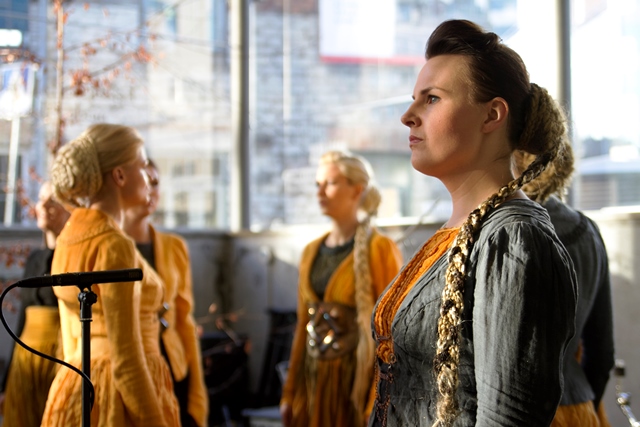 Somewhat less relatable to what’s beyond Latvia’s borders are Latvian Voices, a female choir with a fresh take on traditional garb and folk music. They are tremendously striking and their staging pin-sharp, but their final song, a cover of U2’s “I Still Haven’t Found What I’m Looking for”, breaks the spell. (pictured right: Latvian Voices. Photo: Ruth Sotnik)
Somewhat less relatable to what’s beyond Latvia’s borders are Latvian Voices, a female choir with a fresh take on traditional garb and folk music. They are tremendously striking and their staging pin-sharp, but their final song, a cover of U2’s “I Still Haven’t Found What I’m Looking for”, breaks the spell. (pictured right: Latvian Voices. Photo: Ruth Sotnik)
Lithuanian accordion player Martynas Levickis is well-known in Britain from topping the classical charts – he must be Lithuania’s most successful musical export. At Must Puudel (black poodle), he demonstrates why he has had such an impact. From Vivaldi’s “Four Seasons” to what sounds like a train chuffing he’s a one-man variety show. The Lithuanian-Estonian jazz quartet Heavy-Beauty are more focussed and built around bass sax-man Liudas Mockũnas (Lithuania) and guitarist Jaak Sooäär (Estonia). They dole out bass-heavy riff after riff. A musical steamroller, they wouldn’t be out of place in front of an (open-minded) metal audience.
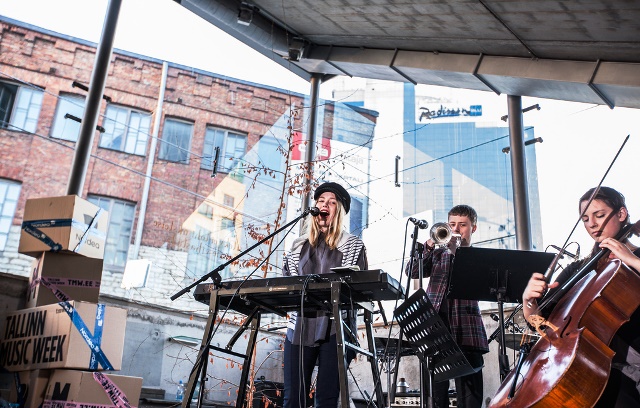 But Tallinn Music Week is ultimately about Estonia’s own music. The riches spread across indie templates, through electro and dance to classical, folk, jazz and metal, but it’s the peculiarly local which resonates most right now. I Wear Experiment are a lovely, slightly tentative, off-balance Broadcast-type band with hints of early Eighties Rough Trade outfit Weekend. Neon Noir have another take on the Eighties: Liverpool’s Lotus Eaters filtered through very early Depeche Mode. (Pictured left: I Wear Experiment. Photo Diana Pashkovich)
But Tallinn Music Week is ultimately about Estonia’s own music. The riches spread across indie templates, through electro and dance to classical, folk, jazz and metal, but it’s the peculiarly local which resonates most right now. I Wear Experiment are a lovely, slightly tentative, off-balance Broadcast-type band with hints of early Eighties Rough Trade outfit Weekend. Neon Noir have another take on the Eighties: Liverpool’s Lotus Eaters filtered through very early Depeche Mode. (Pictured left: I Wear Experiment. Photo Diana Pashkovich)
When things become unfamiliar, Estonia's unique voice is evident. The violinists Duo Jansen Jussi are half Norwegian (Jo Einar Jansen), but Estonia in the form of Johanna-Adele Jüssi dominates. Although their playing has the circularity of traditionally derived Norwegian music, the overall effect verges on an ambient music shot through with dance rhythms. Another duo, this time all Estonian, featuring Kulno Malva and Tõnis Kirsipu, are even wilder. Imagine Tom Waits singing while playing an accordion with death-march drums. Utterly compelling.
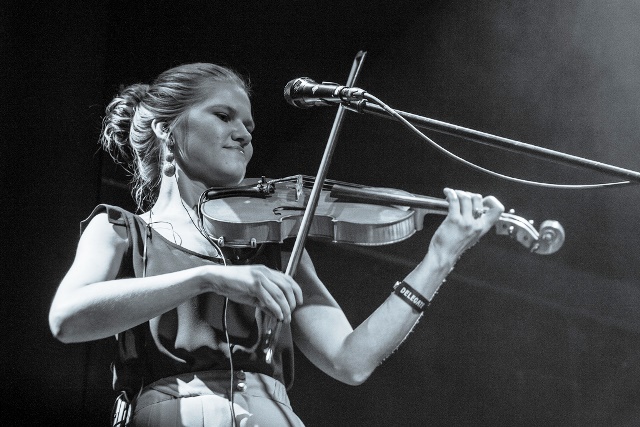 Intensity levels ramp up even further with solo violinist Maarja Nuut whose take on traditional regional Estonian polkas turns them into a form of serial music. She talks of the country’s south having a lot of devils. (Pictured right: Maarja Nuut. Photo: Lina)
Intensity levels ramp up even further with solo violinist Maarja Nuut whose take on traditional regional Estonian polkas turns them into a form of serial music. She talks of the country’s south having a lot of devils. (Pictured right: Maarja Nuut. Photo: Lina)
For fears which seem more manifest, folk stylist Mari Kalkun speaks of a nightmare she had over the past couple of weeks where she dreamed of escaping falling bombs. Her fears are incorporated into “Unetulaul” (Sleepless), a song based on traditional Estonian lullabies. She then performs a goose bump-inducing recitation titled “Linnaitk” (City Lament) which draws from mothers' laments for their departing children which are reconfigured to be about the gradual desertion of her home village in the Vôrumaa region. She connects this with what might be coming to Estonia.
A reminder that Russia has forced Estonia onto a new frontline comes after Tallinn’s Ukrainian Cultural Centre hosted a reception-come-concert in the courtyard enclosed within the warren of medieval buildings housing it. The folk-based band Svjata Vatra play. Their frontman and trombonist Ruslan Trochynskyi is Ukrainian. The band – otherwise Estonian – formed in Estonia.
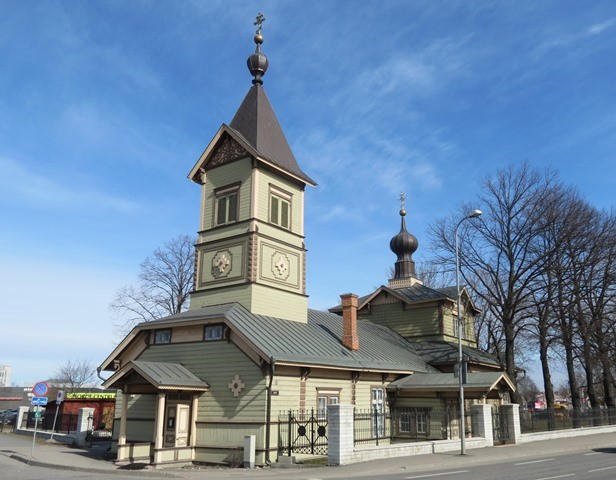 Before Svjata Vatra take the makeshift stage, Ukraine’s Ambassador to Estonia Viktor Kryzhanivsky, says of his country that it is “undergoing very important changes. We are facing aggressors. After the people’s uprising, we have a chance to build a civilised nation. I’m convinced this will be achieved. Russia used a very good moment to attack us. Just when we were building democratic institutions, they attacked us. They do not want to see a democratic Ukraine. Crimea remains the territory of Ukraine, I’m convinced it will be returned.”
Before Svjata Vatra take the makeshift stage, Ukraine’s Ambassador to Estonia Viktor Kryzhanivsky, says of his country that it is “undergoing very important changes. We are facing aggressors. After the people’s uprising, we have a chance to build a civilised nation. I’m convinced this will be achieved. Russia used a very good moment to attack us. Just when we were building democratic institutions, they attacked us. They do not want to see a democratic Ukraine. Crimea remains the territory of Ukraine, I’m convinced it will be returned.”
This is now, but the recent past is never far. A 15-minute walk away is a poignant symbol of Russia’s impact as occupying power. The timber-built Cathedral of St Simeon and Hanna (pictured above left) is the home of the Orthodox Church of Estonia. During the Soviet occupation it was used as a training hall for sports. Basketball rather than worship was the order of the day. Constructed in 1752, the church is a rare survival. It's been much altered but retains its original integrity, having had a beautiful and sympathetic restoration. The internal columns and tower had been removed. They have now been replaced.
Amongst the iconography in the Cathedral’s altar friezes are images of dragons. They represent chaos to be kept in check. The fact that this place of worship with its calming atmosphere has come back to life is another reminder that Estonia, like its Baltic neighbours, is an independent nation which cherishes freedom. Normally, that might not be such a powerful message. But as is so evident from Tallinn Music Week, these are not normal times.
Watch Estonia's President Toomas Hendrik Ilves's introduction to Tallinn Music Week 2014
Watch the Pussy Riot interview at Tallinn Music Week 2014

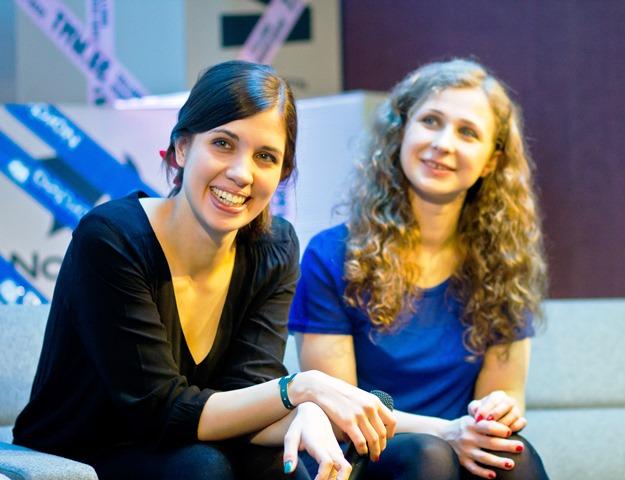













Add comment